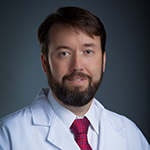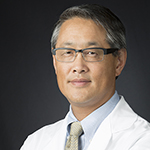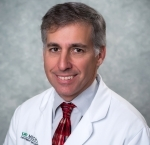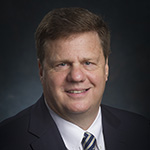Recently, an editorial in Nature highlighted a trend that surgeon interest in conducting research is decreasing in the U.S. The article cited two recent studies that document this trend and called for improvements to the environment of academic surgery to again recognize the value of scientific research.
Adam Beck, M.D. Dr. Adam Beck, director of the UAB Division of Vascular Surgery and Endovascular Therapy, said he wholeheartedly agrees with the issues raised in the article and pointed to the important role surgeon-led research has played in advancing his field and improving outcomes for patients.
Dr. Adam Beck, director of the UAB Division of Vascular Surgery and Endovascular Therapy, said he wholeheartedly agrees with the issues raised in the article and pointed to the important role surgeon-led research has played in advancing his field and improving outcomes for patients.
“Historically, aortic disease required large incisions and highly morbid operations, but we are now able to treat patients with just two, one-centimeter incisions in the groin,” Beck said. “These advances were led by surgeons and came not only from clinical research, but also from rigorous bench research required for device development.”
The argument put forth by the editorial and echoed by Beck is that surgeons play too important a role to forgo research. Yet, according to the data highlighted in the article, grant submissions and funding, as well as publications from surgeons, have decreased.
 Dr. Herbert ChenHowever, this is not the case for the UAB Department of Surgery. Due in part to a renewed focus and an investment in research from surgery leadership, including Department Chair Herbert Chen, M.D., UAB Surgery faculty have increased grant submissions by more than 180 percent when comparing the period of October 2016 – March 2017, versus the same period last year. In the current six-month period, faculty have submitted 54 new or competitive grants in contrast to only 19 submissions the previous year.
Dr. Herbert ChenHowever, this is not the case for the UAB Department of Surgery. Due in part to a renewed focus and an investment in research from surgery leadership, including Department Chair Herbert Chen, M.D., UAB Surgery faculty have increased grant submissions by more than 180 percent when comparing the period of October 2016 – March 2017, versus the same period last year. In the current six-month period, faculty have submitted 54 new or competitive grants in contrast to only 19 submissions the previous year.
“I’m proud of our faculty’s efforts to help the Department meet these research goals set forth by UAB Medicine,” Chen said. “We have a strong group of surgeon-scientists, and through mentorship and recruitment, more faculty members are taking part in research.”
Despite these gains, Chen said he acknowledges the reality of the barriers highlighted in the article and knows those issues also exist at UAB.
“To help faculty successfully conduct research, our Department is developing a research culture that promotes surgeon involvement, while also being mindful of the demands research places on a surgeon’s time,” Chen said.
 Dr. Marc PassmanMarc Passman, M.D., the Department of Surgery’s vice chair of clinical research, concurred, explaining that research is more than a scientific pursuit at UAB.
Dr. Marc PassmanMarc Passman, M.D., the Department of Surgery’s vice chair of clinical research, concurred, explaining that research is more than a scientific pursuit at UAB.
“The most influential advances come from the intersection of the art and the science of medicine. Our department is focused on fostering that collaboration,” Passman said. “We’re using a collaborative approach to research that requires a model of partnership between surgeons and scientists who have similar interests and who can work together to help us successfully merge those two concepts. You can’t have your surgeons or your researchers working alone in a vacuum.”
“Teamwork is critical,” said James Bibb, Ph.D., vice chair of basic research for the Department of Surgery. “Physicians have the talent and intellect to make subtle connections, but they may not always have the time to expand their question, form hypotheses or develop the models and resources to drill down and find the causes. Therefore, teamwork between physicians and scientists is required to develop the optimal research environment.”
 Dr. James BibbBibb also cited the importance of a collaborative research community that helps faculty identify resources beneficial to them. He said, for example, there are many foundation and society career development awards for early career physicians who are involved in research.
Dr. James BibbBibb also cited the importance of a collaborative research community that helps faculty identify resources beneficial to them. He said, for example, there are many foundation and society career development awards for early career physicians who are involved in research.
“I’ve charged our research leadership team with matching funding opportunities with qualified faculty,” Chen said. “It is my goal for faculty to receive personal notification when there is a grant opportunity that is appropriate for them.
“You cannot secure grant funding without applying, so that is why it is important that we are increasing our grant submission numbers. But time is valuable, so we want our faculty to be applying for awards they have a high probability of receiving.”
“The author of the article was right in that the demands placed on surgeons have increased. There’s just only so much time in a day,” Passman said. “However, surgeons want to improve patient care and advance their field. Surgeons are excited about research when that research reflects their interests and talents, and it’s up to the department to make an effort to provide faculty members with opportunities to maximize their potential and realize their goals.”